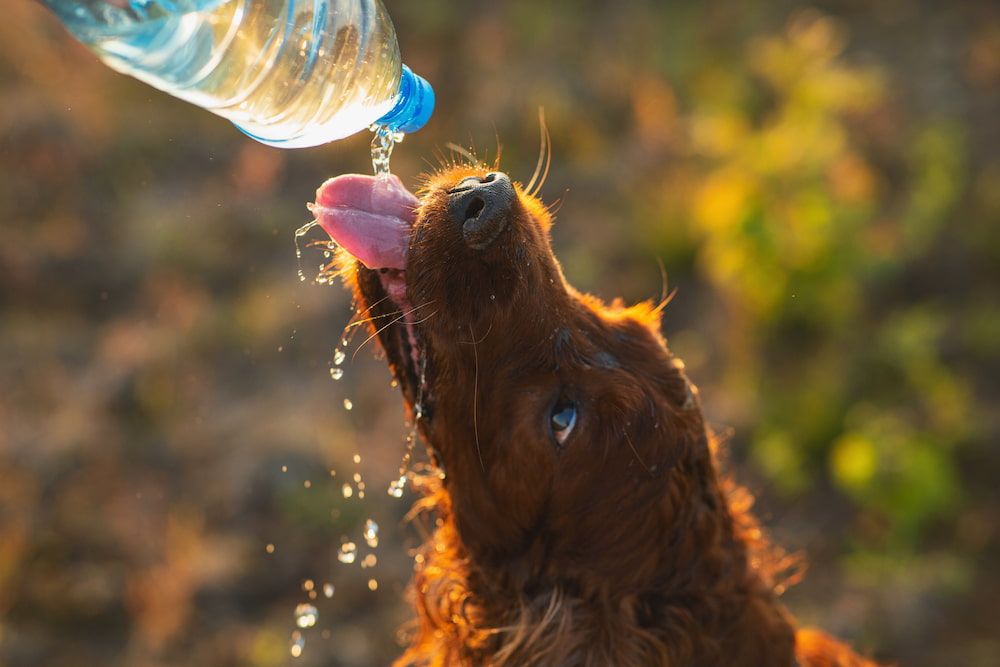Guide on Which Water Is Best for Our Dogs
Written by:
Author: Vicki Smirnova
Vicki Smirnova is a professional writer and editor who adores animals and helps readers get along well with their pets. She has been working in digital media for more than 5 years and has great experience writing content about lifestyle, including pets. Vicki specializes in dog health and nutrition, cat feeding, dog training. She is an aquarium lover and is passionate to write about fish care at home. Also, Vicki headed several websites and worked as a news editor.
View all 244 articlesLearn about our editorial process and veterinary review board.
Viewed: 89
Updated on: 06/27/2023
Maintaining proper hydration for your dog’s wellbeing is paramount to their health. Like us, dogs rely on moisture for survival, including digestion, absorption of essential nutrients, waste removal, temperature regulation, and joint protection.
Choose a water source carefully for your dog’s hydration needs. Multiple choices, such as tap, bottled, or filtered options, are available to you. Unfortunately, not all types of moisture offer equal hydration quality. Understanding these differences is key to providing your pup with optimal hydration needs.
Understanding Different Types of Water
Understanding different types of water is vital for providing our dogs with adequate hydration. One popular source is tap liquid. However, its quality varies significantly and, in certain areas, could contain harmful substances like heavy metals, chlorine, and bacteria that could make this choice unsafe.
Bottled water can also be viable and is often considered safer than tap liquid due to stricter regulations on bottled companies. Unfortunately, its plastic bottle usage raises environmental concerns. Furthermore, its cost makes bottled moisture less sustainable over time.
Filtered water offers multiple advantages. It screens out harmful contaminants in tap liquid while providing essential minerals supporting canine health. Furthermore, the cost-efficiency of filtering systems filters becomes apparent over time. Get a berkey water filter here to clean your dog’s moisture today.
Remember that each liquid type offers its own advantages and disadvantages. When selecting one for your pup’s health and wellbeing, keep location, budget, and potential health impacts in mind. Whatever decision is made, ensure they stay properly hydrated.
The Science Behind Dog’s Hydration
Hydrating your pet well is key for their overall health. Just as humans need liquid, dogs do too. But what sets dog water apart?
Dogs rely on essential minerals from their water for bone health and nerve function, potassium regulation, and fluid balance regulation. Magnesium is necessary to provide healthy muscle and nerve functioning. Calcium supports bone health, while potassium balance regulates fluid balance regulating. Magnesium promotes overall healthy muscle and nerve functioning. Thus, good moisture sources can supplement their diet with essential minerals.
Next is the pH level in dogs’ water. pH measures the acid-base balance. Its range spans from 0 (acidic) to 14 (alkaline), with 7 being neutral as its median point.
The ideal pH level for dogs’ drinking liquid should be close to 7. While they can tolerate slightly alkaline solutions, high pH readings could indicate hard water containing potentially harmful minerals.
On the other hand, low-pH moisture conditions are acidic, eroding the enamel on a dog’s teeth and leading to urinary issues over time. Dogs can regulate their body’s pH balance. But extreme pH levels in drinking water may complicate this ability.
Noting the pH balance in the liquid is also crucial to creating healthier and shinier coats for canines. A proper pH balance in their environment will encourage healthier coats with greater shine.
Testing your dog’s moisture pH regularly is a best practice, and inexpensive test kits can be purchased at pet stores or online. For further insight, refer to understanding the Importance of Water pH in Dogs. It offers invaluable knowledge of hydration science in dogs.
How to Choose the Right Water for Your Dog
Selecting the ideal liquid for your furry companion is a key decision, so consider various aspects to find the ideal option.
First, assess your location. Water quality varies significantly by region. While some might have access to clean, safe tap liquid sources, others might need access to clean, safe tap liquid sources. Tap liquid can contain fluoride, chlorine, and possibly harmful bacteria. In contrast, some regions might even contain heavy metals. So understanding your local moisture quality is key.
Second, consider your dog’s health. Pets suffering from certain medical conditions might need special liquid types. For instance, kidney problems could require low-sodium water. Always consult your vet about which liquid type will best meet the needs of your pup.
Tap liquid quality should also be carefully considered. Tap liquid may contain contaminants harmful to your pet, such as chemicals, heavy metals, and bacteria that could pose risks. If the quality could be better in your area, consider other solutions as soon as possible.
Water purified by filtration is an ideal option for your pet. It eliminates impurities that might otherwise pollute tap liquid, such as harmful bacteria, heavy metals, and certain chemicals. Filtered liquid also improves taste, encouraging your dog to drink more. It also means a happy and healthy pup.
Consider investing in a reliable liquid filter like Berkey. These filters remove over 200 contaminants while leaving behind beneficial minerals. This provides your dog access to safe, clean drinking liquid with the optimal balance of minerals.
Filtered water is an invaluable investment for your dog’s well-being. Not only does it ensure adequate hydration, but it can also reduce disease risks. By choosing filtered liquid as their drink of choice, you show them all the love and care they deserve.
The Impact of Filtered Water on Dogs’ Health
Filtered liquid offers several benefits that could significantly benefit our dogs’ health, which will be explored further here. It has several key advantages for your dogs, as discussed below:
Water purified by filtration can greatly aid our dogs’ digestion. Dogs, like humans, rely on adequate hydration for effective digestion. Water aids the breakdown of food into nutrients which are then readily absorbed. A dog well hydrated with filtered liquid will have an easier time digesting their meals more efficiently.
Besides, the liquid decreases the risk of stomach upsets in our pets. Chlorine found in tap liquid can disrupt their system, so by filtering these impurities out, we ensure our furry friends do not experience unnecessary discomfort.
Filtered liquid not only aids digestion but can also prevent exposure to toxins. Tap liquid may contain various pollutants ranging from heavy metals like lead and bacteria, which could compromise your dog’s health over time. Consuming such contaminants over time could be detrimental.
The impact of water quality on animal health shows the correlation between poor liquid quality and various health conditions. These include liver and kidney diseases in animals and poor physical conditions.
Filtered water offers the solution. Premium filters such as Berkey can effectively filter out impurities for safe drinking liquid for dogs.
It can also help mitigate dental problems. Tap liquid may contain high concentrations of minerals, contributing to dental issues. Using filtered liquid reduces this risk, aiding overall oral health.
Water prepared by filtration tastes better. Its taste is enhanced without impurities to alter its flavor, encouraging dogs to drink it more frequently for optimal hydration and health.
Filtered liquid offers many health benefits for our canines, including improved digestion, decreased toxin exposure, and overall improvement in health. It offers us the chance to take an active step towards providing them with healthier lives.
RELATED: How Long Can a Dog Go Without Water?
Making the Switch to Better Water
Change can be daunting for all living beings, including our furry companions. While switching to filtered liquid may appear intimidating initially, it can be more manageable than you imagine.
1. Transitioning Your Dog to Filtered Water
Introduce filtered liquid by mixing it with your dog’s current source, gradually increasing the filtered to unfiltered water ratio over a week.
Monitor their response as some dogs may take to this transition period without issue. For others, however, patience must be displayed during this process.
Consistency is key when transitioning your pet to filtered liquid. Stay consistent between different kinds, as that may confuse them.
2. Tips for Encouraging Dogs to Drink More Water
- Make water accessible. Always ensure clean and fresh water for you and your family to drink, and place multiple liquid bowls around the home as a convenience measure.
- Maintain Hygiene. Ensure your dog’s liquid bowl remains spotlessly clean. Bacteria thrive in dirty bowls, deterring dogs from drinking their fill.
- Purchase a liquid fountain. Many dogs enjoy running liquid, which could encourage more frequent drinking sessions.
- Add flavor to your water using healthy options, such as broth or pet-safe liquid additives, that won’t increase sodium intake. Remember that any additions stay below 200 milligrams/liter of sodium content.
- Hydrate through meals. Incorporating wet food into your dog’s diet is a great way to increase hydration. It acts as an extra source of liquid intake.
Remember that dogs’ water intake varies depending on their size, age, and activity level. For best results when considering your pup’s hydration needs, consult your veterinarian if there are concerns over his liquid consumption.
Switching your dog to filtered liquid requires careful planning, patience, and consistency. However, the long-term health benefits make the effort worth your while. Ensure their hydration needs are prioritized, giving them access to clean liquid. After all, they rely on you for their well-being.
RELATED: When Is It Too Hot To Walk Your Dog?
Conclusion
Selecting water that meets all their health and welfare requirements is of utmost importance for their overall well-being, with filtered liquid being an especially good option due to its purity and safety. Filtered sources offer an effective means of shielding your pet from potential toxins found in tap liquid sources.
Your dog’s diet is integral to its digestion and overall health. So, when selecting its source of water, it is essential that you consider its specific requirements and needs as part of the decision-making process.
Stay educated and informed regarding your pet’s health. Hydration plays a pivotal role in dog health. Let’s prioritize their well-being by giving our furry friends only quality liquid sources.
 Dog Veterinary Tips Why is my Dog throwing up: Causes and Preventing (Veterinary Advice)
Dog Veterinary Tips Why is my Dog throwing up: Causes and Preventing (Veterinary Advice) - 23424
- 5
 Dog Care Why Is My Dog Bleeding From Its Butt? Causes and treatment of rectal bleeding in the dog
Dog Care Why Is My Dog Bleeding From Its Butt? Causes and treatment of rectal bleeding in the dog - 22076
- 0
 Dog Care My Dog Keeps Scratching His Mouth: Reasons Why Your Dog Scratching Face
Dog Care My Dog Keeps Scratching His Mouth: Reasons Why Your Dog Scratching Face - 17561
- 1
























